Every month the STEM Education Center will highlight one of its many outstanding graduate students who work hard to improve the field of STEM Education.
This month the STEM Education Center would like to spotlight- Emily Dare
Emily has received a B.S. and M.S. in Physics and will receive her Ph.D. in the spring of 2015. She is currently working on the EngrTEAMS project where she works with eleven elementary and middle school teachers to create integrated STEM modules that the teachers bring into their classrooms and later publish onto a nation-wide website for other K-12 teachers to use. Emily is also working with the St. Paul science coaches to conduct classroom observations of all of their science teachers in an effort to understand the needs these teachers have that will be addressed in district-wide summer professional development sessions. Born in Somers Point, New Jersey, Emily dreamed of owning an art shop and grew to love the color green. Emily is the proud parent of a retired greyhound named Bernie and is often nicknamed Em. Her favorite food is any kind of cheese and her favorite place to visit in Minneapolis/St. Paul, besides the STEM Education Center, is the restaurant Pannekoeken Huis. Lastly, is Emily could have one super power she would like to fly. The STEM Education Center would like to thank Emily for her accomplishments and contributions to our research and we are happy to have her as a part of the team.
Read about out other highlighted graduate students here
Congratulations to District 622 on new STEM Grant!
From: www.lillienews.com
The North St. Paul-Maplewood-Oakdale School District will be taking its Science Technology Engineering and Math (STEM) program to the next level, thanks to two grants totaling $350,000 from the 3M Foundation.
In December, the 3M Foundation Board approved District 622’s request to fund a comprehensive K-12 STEM program, including equipment for Fabrication Labs (FabLabs) at both North and Tartan high schools.
The funding will allow District 622 to expand its successful elementary STEM program and incorporate new classes and new opportunities at both the middle and high schools.
Included in the $350,000 is a $66,000 grant from Project Lead The Way (PLTW), the nation’s leading STEM program.
Beginning next fall, students in grades sixth and seventh will all take the PLTW Modeling and Design course. Eighth grade students will also have the opportunity to take this course as an elective. Additional PLTW courses will be added in subsequent years.
At the high school level, an engineering focus will be added to the required ninth grade science course during the 2014-2015 school year. The District will also begin the process of exploring options for creating FabLabs at both North and Tartan high schools.
FabLabs allow students to use hands-on, state-of-the-art technology including 3D printers, laser engravers and plasma routers. $200,000 of the grant funds from 3M will be used to purchase FabLab equipment for the two high schools.
This summer, District science teachers will begin training on curriculum for the new courses. The training is being provided through a partnership with the University of Minnesota’s STEM Education Center.
“In just one year of implementing the STEM curriculum at our elementary schools we have seen incredible academic growth for our students in the area of science,” said Superintendent Patty Phillips. “I am thrilled that the 3M Foundation is providing us with a way to extend that success for all students.”
CASCW receives National Science Foundation grant for data intensive research on child well-being
The Center for Advanced Studies in Child Welfare at the University of Minnesota School of Social Work has received a competitive grant from the National Science Foundation (NSF) that will provide $489,119 over three years to create the capacity for data intensive research through expansion of the Center’s Minn-LInK project.
 The Minn-LInK project, or Minnesota Linking Information for Kids, is an integrated, cross-system data project housed at the Center for Advanced Studies in Child Welfare. Minn-LInK utilizes administrative data from state agencies to examine a variety of indicators of well-being for children involved in the child welfare system and children in other at-risk populations, with an aim of highlighting policy and practice implications and improving services for children.
The Minn-LInK project, or Minnesota Linking Information for Kids, is an integrated, cross-system data project housed at the Center for Advanced Studies in Child Welfare. Minn-LInK utilizes administrative data from state agencies to examine a variety of indicators of well-being for children involved in the child welfare system and children in other at-risk populations, with an aim of highlighting policy and practice implications and improving services for children.
For example, a recent study examined educational outcomes of children involved in the child welfare system, with a specific focus on children in out-of-home placement, or foster care. This study helped local and state educators and service providers (including the Minnesota Educational Stability Taskforce) better understand the educational experiences of this at-risk population and informed decision-making. Minn-LInK uses data in accordance with data sharing agreements and strict security protocols are in place to ensure the privacy and confidentiality of data.
The NSF grant will allow the Center to expand the infrastructure of Minn-LInK by integrating additional statewide administrative data and developing ready-to-use datasets and tools. It will also fund the creation and piloting of the Minn-LInK Fellowship Program to prepare future researchers for cross-system research on child well-being. Through this grant the Center will be able to organize a community of researchers whose focus is on child well-being.
For more information, visit the Minn-LInK webpage.
New guidebook provides strategies for creating a permanence-driven child welfare organization
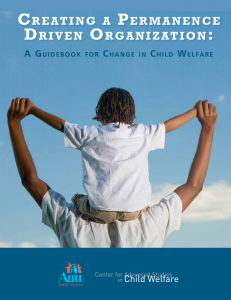 A new publication from the Center for Advanced Studies in Child Welfare (CASCW) and Anu Family Services provides guidance for creating a permanence-driven child welfare organization.
A new publication from the Center for Advanced Studies in Child Welfare (CASCW) and Anu Family Services provides guidance for creating a permanence-driven child welfare organization.
Creating a Permanence Driven Organization: A Guidebook for Change in Child Welfare outlines processes by which agencies can shift from helping youth to simply survive to helping youth thrive through a permanence-driven framework, using the experiences of Anu Family Services staff. Since 2006, Anu Family Services was able to increase permanence outcomes for youth exiting treatment foster care by 84 percent through implementation of evidence-informed practices, significant cultural and organizational change, and extensive changes in practice.
You can download this free resource here.
Annette Semanchin Jones, MSW, PhD and Traci LaLiberte, MSW, PhD of CASCW and Amelia Franck Meyer, MS, MSW, LISW, APSW of Anu Family Services authored the publication.
Stability, Permanency & Adoption Coordinator JaeRan Kim featured in CEHD Profiles
The College of Education + Human Development (CEHD) at the University of Minnesota regularly features Students, Faculty, and Alumni of CEHD. Recently CEHD featured a staff member from the Center for Advanced Studies in Child Welfare (CASCW).
 JaeRan Kim, MSW is a PhD Candidate at the School of Social Work and the Stability, Permanency and Adoption Coordinator at CASCW. Her profile on CEHD’s Featured People highlights her personal story and how it has influenced her career and research path: “As a Korean adoptee and an active member of the adoptee community, she always knew she would focus her work and research on inter-country adoption.”
JaeRan Kim, MSW is a PhD Candidate at the School of Social Work and the Stability, Permanency and Adoption Coordinator at CASCW. Her profile on CEHD’s Featured People highlights her personal story and how it has influenced her career and research path: “As a Korean adoptee and an active member of the adoptee community, she always knew she would focus her work and research on inter-country adoption.”
At CASCW, JaeRan manages the Permanency and Adoption Competency Certificate (PACC), a certificate program for child welfare and mental health professionals. Her dissertation research focuses on the placement and stability of internationally adopted children with disabilities.
You can read more about JaeRan here.
CASCW study provides snapshot of youth experiences in private placement settings
In February 2012, the Center for Advanced Studies in Child Welfare (CASCW) in collaboration with the Minnesota Council of Child Caring Agencies (MCCCA) conducted a study to examine adoption disruptions and dissolutions among children in Minnesota’s private-agency out-of-home placements. Preliminary results from this study are now available online.
In conducting this study, CASCW and MCCCA hoped to gain a better understanding of the experiences of children in private out-of-home placements in Minnesota. What is contained in the preliminary results is a side-by-side comparison of data from all residential facilities, group homes, and foster homes that participated in the study.
In sum, there were 938 youth from 34 agencies in the sample.
- The largest percentages of children were placed by a court order; this was higher in treatment foster homes (74.3% of youths) and lower in residential treatment (16.9%).
- The average youth from within this study experienced 1 to 2 previous placements.
- 77.6% never experienced a finalized adoption or pre-adoptive placement.
- 92% of the youth had a disability/diagnosis.
- The most frequently diagnosed disorders held across all placement types; these were Disruptive Behavior Disorder, Mood Disorder, Anxiety Disorder, Post-Traumatic Stress Disorder, and Reactive Attachment Disorder.
In-depth analysis of data is ongoing with an anticipated completed report later this year.
For more information on this report, please contact the Principal Investigator for this study, Dr. Traci LaLiberte, at lali0017@umn.edu.
ICYMI: CASCW’s Executive Director discusses 5 recommendations for foster care success in CEHD’s Vision 2020 Blog
On Friday, May 31, at the conclusion of National Foster Care Month, Dr. Traci LaLiberte, the executive director of the Center for Advanced Studies in Child Welfare, wrote for the College of Education and Human Development’s Vision 2020 Blog on how we can improve child welfare services through research. The recommendations she listed were:
- Practitioners must be trauma sensitive.
- Kids should remain connected to people, routines, and activities in their current lives while in out-of-home care.
- Kids must be supported in their connections with adults and be able to understand safe connections.
- Professionals should work together across fields/systems to promote children’s well-being.
- Professionals should actively attend to the wider range of well-being indicators for children in out-of-home care.
Read the entire blog post here, and let us know what you think!
New FREE certificate program for metro-area child welfare practitioners
The Center for Advanced Studies in Child Welfare (CASCW) is collaborating with the Center for Early Education and Development (CEED) and the Institute of Child Development (ICD) to offer metro-area child welfare practitioners the opportunity to enroll in the University of Minnesota Infant and Early Childhood Mental Health (IECMH) certificate program at no cost to participants or counties. This intensive training promotes interdisciplinary skills and policies necessary to support the social emotional development of at-risk children ages birth to five and the well-being of families.
This training is founded on a core set of infant and early childhood mental health principles, asserting that child welfare services (among others) for families should be relationship-based, multi-generational, culturally sensitive, grounded in developmental and trauma theory, and supported by reflective practice.
One-Year Program Structure
Orientation will be September 12, 2013 from 9:00 AM to 4:00 PM. The course will meet one Thursday and Friday per month for 8 months (September 2013 through April 2014) at the University of Minnesota.
- Thursdays: 3:00 PM to 7:00 PM
- Fridays: 8:30 AM to 3:30 PM
Consultation will be bi-weekly (twice per month) in small group sessions for four months (May through August 2014).
Program Enrollment
IECMH will hold three spaces for participants from each of the metro-area counties—Anoka, Carver, Dakota, Hennepin, Ramsey, Scott, Washington, and Wright—until July 1st. After that, the spaces will be opened to participants from any of the metro-area counties on a first-come, first-serve basis. We are encouraging all applicants to talk with their supervisors/managers prior to submitting their applications. County administrators will be consulted by IECMH in prioritizing applications from each county.
For more information and to request an application, please email Ellen Lepinski at lepin008@umn.edu. You can also visit the website at http://z.umn.edu/iecmhcw.
Archived video footage of “The Intersection of Child Welfare and Disability” conference now available online
On Tuesday, May 7, the Center for Advanced Studies in Child Welfare (CASCW) held their 14th annual child welfare conference, “The Intersection of Child Welfare and Disability,” featuring Dr. Dick Sobsey from the University of Alberta, Dr. Traci LaLiberte from CASCW, and Dr. Elizabeth Lightfoot from the University of Minnesota School of Social Work. CASCW has since made available archived video footage for online viewing.
To view the conference online via archived video, or to download materials and handouts from the conference, please visit http://z.umn.edu/cwdisability.
Two new child welfare policy briefs now available on CASCW website
The Center for Advanced Studies in Child Welfare has published two new child welfare policy briefs:
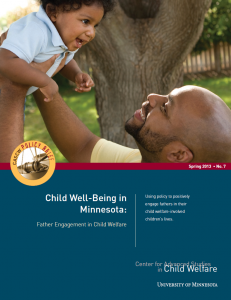 |
Father Engagement in Child Welfare looks at how policy can be used to positively engage fathers in their child welfare-involved children’s lives. Highlighted policy issues surround bringing consistency to practice, coordinating between child protection and child support, and overcoming legal barriers to involvement. | |
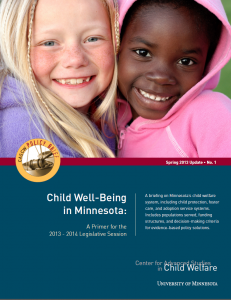 |
Child Well-Being in Minnesota: A Primer for the 2013–2014 Legislative Session is a briefing on Minnesota’s child welfare system, including child protection, foster care, and adoption service systems. It highlights populations served, funding structures, and decision-making criteria for evidence-based policy solutions. |
To access all seven child welfare policy briefs, please visit the Center’s Child Welfare Policy Briefs webpage, part of the overall Child Welfare Policy web section.
New tool measures connections of youth in foster care with supportive adults
A new tool called the Youth Connections Scale has been developed by Annette Semanchin Jones, Ph.D. candidate at the School of Social Work, and Traci LaLiberte, executive director of the Center for Advanced Studies in Child Welfare, in partnership with Anu Family Services, that measures the level of connectedness of youth in foster care with supportive adults.
Research has shown that supportive adult connections for youth have many positive long-term effects, including improved self-esteem, educational achievement, and social skill development. Yet too often, youth lose their prior supportive adult connections while in out-of-home care.
 The Youth Connections Scale, or YCS, was developed to fill a need in child welfare: to evaluate and measure the increased efforts of agencies to improve the level of connectedness of youth with supportive adults as a component of relational permanence of youth in foster care. Relational permanence has been defined as the lifelong connections youth develop to caring adults, which include at least one adult who will provide a permanent, parent-like connection for that youth. Many experts and scholars now advocate for child welfare agencies to increase their focus on building such permanent, supportive connections for youth while in out-of-home care.
The Youth Connections Scale, or YCS, was developed to fill a need in child welfare: to evaluate and measure the increased efforts of agencies to improve the level of connectedness of youth with supportive adults as a component of relational permanence of youth in foster care. Relational permanence has been defined as the lifelong connections youth develop to caring adults, which include at least one adult who will provide a permanent, parent-like connection for that youth. Many experts and scholars now advocate for child welfare agencies to increase their focus on building such permanent, supportive connections for youth while in out-of-home care.
The results of a pilot validation study of the YCS indicate that the YCS is a useful tool for child welfare agencies to measure the relational permanence of youth in foster care and strengthen their practice of creating a safety net of caring and supportive adults for these youth. This study was recently accepted for publication in Children and Youth Services Review1.
For more information on the YCS, please visit the Center for Advanced Studies in Child Welfare’s Youth Connections Scale website at http://z.umn.edu/YCS.
First cohort of adoption-competent mental health and child welfare workers to graduate
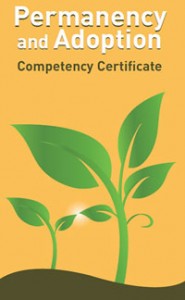 On January 18, 2013, the Center for Advanced Studies in Child Welfare (CASCW) will graduate its first cohort of 39 adoption-competent mental health and child welfare workers through CASCW’s Permanency and Adoption Competency Certificate (PACC) program. The graduation celebration will take place from 4 PM to 6 PM in the Minnesota Commons Room at the University of Minnesota St. Paul Student Center. Senator Amy Klobuchar, Representative Michele Bachmann, and the Human Services Commissioner Lucinda Jesson have been invited.
On January 18, 2013, the Center for Advanced Studies in Child Welfare (CASCW) will graduate its first cohort of 39 adoption-competent mental health and child welfare workers through CASCW’s Permanency and Adoption Competency Certificate (PACC) program. The graduation celebration will take place from 4 PM to 6 PM in the Minnesota Commons Room at the University of Minnesota St. Paul Student Center. Senator Amy Klobuchar, Representative Michele Bachmann, and the Human Services Commissioner Lucinda Jesson have been invited.
The PACC is a professional training program developed in response to community demand for an adoption-competent mental health and child welfare workforce able to serve the unique and complex clinical and practice needs for adopted individuals and their families throughout Minnesota. Through the PACC, mental health and child welfare workers are given the knowledge and skills needed to serve families and help prevent disruptions in the post-adoption period.
The PACC includes the nationally recognized Training on Adoption Competency curriculum developed by the Center for Adoption Support and Education (C.A.S.E.) and additional modules focusing on child welfare permanency and the Indian Child Welfare Act. The PACC emphasizes the use of ‘real world’ case studies, small group work, and partner interactions in order to promote critical thinking and practice application discussions among participants.
“Going through the different case studies and having discussion was most helpful and relevant, as I can use the feedback [and] ideas to help in my job in engaging families I work with.” Participant Response
Graduates of the PACC will be listed in a searchable online database. Families and professionals will have access to this database in order to locate adoption-competent practitioners in their area.
There are 37 additional participants in the current (fall 2012) cohorts in Rochester and the Twin Cities that will graduate in 2014.
For more information, please visit the PACC website.
CASCW selected by Sen. Klobuchar for national Angels in Adoption award

The Center for Advanced Studies in Child Welfare (CASCW) has been selected by Senator Amy Klobuchar as one of this year’s Angels in AdoptionTM for outstanding advocacy in preparing adoption-competent clinical mental health and child welfare professionals for their work with adopted children and their families. The Congressional Coalition on Adoption Institute (CCAI), which orchestrates the Angels in AdoptionTM program, will honor CASCW, along with more than 140 other Angels, at an awards ceremony and gala event on September 11 and 12 in Washington, D.C.
Established in 1999, the Angels in AdoptionTM program is CCAI’s signature public awareness campaign that provides an opportunity for Congress to honor the good work of their constituents who have enriched the lives of children in foster and adoptive homes in the United States and abroad.
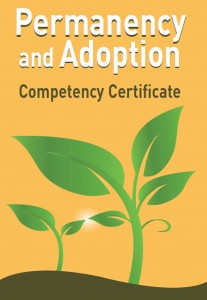 Part of the University of Minnesota’s School of Social Work, CASCW is being honored for its Permanency and Adoption Competency Certificate (PACC), a professional training program that was developed in response to community demand for an adoption-competent mental health and child welfare workforce able to serve the unique and complex clinical and practice needs for adopted individuals and their families.
Part of the University of Minnesota’s School of Social Work, CASCW is being honored for its Permanency and Adoption Competency Certificate (PACC), a professional training program that was developed in response to community demand for an adoption-competent mental health and child welfare workforce able to serve the unique and complex clinical and practice needs for adopted individuals and their families.
“Competent post-adoption support and adoption-competent mental health providers are critically needed to support and strengthen adoptive families,” says JaeRan Kim, Project Coordinator at the Center for Advanced Studies in Child Welfare. “We are proud that our Center can contribute toward ensuring that mental health and child welfare practitioners in the state of Minnesota understand the unique and often complex needs of children, youth, and families that have been impacted by foster care and adoption.”
The PACC program provides mental health and child welfare professionals the knowledge and skills they need to work with individuals and families involved in permanency and adoption. This helps to prevent disruptions in the post-adoption period.
Continue reading “CASCW selected by Sen. Klobuchar for national Angels in Adoption award”
New child welfare policy brief on older youth with disabilities in foster care
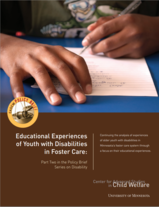 The Center for Advanced Studies in Child Welfare has issued a new child welfare policy brief, part two in the series on disability and child welfare. This policy brief focuses on the educational experiences of older youth with disabilities in Minnesota’s foster care system.
The Center for Advanced Studies in Child Welfare has issued a new child welfare policy brief, part two in the series on disability and child welfare. This policy brief focuses on the educational experiences of older youth with disabilities in Minnesota’s foster care system.
In particular, the brief highlights three different policy issues and presents possible solutions to each, based on dissertation research from Katharine Hill, PhD, Assistant Professor at the University of St. Thomas School of Social Work and Consulting Researcher with the Center for Advanced Studies in Child Welfare.
To access all six child welfare policy briefs, please visit the Center’s Child Welfare Policy web section.
FORUM: Transition to Fatherhood – A Hopeful Approach to Engagement
Join the Center for Advanced Studies in Child Welfare with several other cosponsoring organizations, including Minnesota Center Against Violence & Abuse and Minnesota Fathers & Families Network, for a community forum on father engagement.
According to a publication by Minnesota Families and Fathers Network, when children grow up with involved fathers they display enhanced social skills, increased curiosity, greater tolerance for stress, higher verbal skills, and increased scores on assessments of cognitive competence. Engaging fathers from the start
Furthermore, evidence demonstrates that when nonresident fathers are involved with their children and child welfare services, outcomes on cases improve.
- Non-resident father involvement is associated with a higher likelihood of reunification.
- The children of highly involved nonresident fathers are discharged more quickly from foster care than children of uninvolved fathers.
- When nonresident fathers are involved, the likelihood of subsequent maltreatment reports substantially decreases.

Tuesday, July 24, 2012
9:00 am – 1:00 pm
Urban Research and Outreach-Engagement Center
2001 Plymouth Avenue North, Minneapolis MN 55411
Space is limited, registration required. Admission is free (lunch included).
To register go to: http://z.umn.edu/fathers
CASCW’s Saahoon Hong, PhD to speak at symposium in Korea
Saahoon Hong, PhD, Minn-LInK Coordinator at Center for Advanced Studies in Child Welfare, has been invited by the Korean Educational Development Institute to speak at the 3rd KEDI-KAERA Education Joint International Symposium in Seoul, Korea on June 22, 2012. His topic is entitled “Student Behaviors and School Violence: Searching for Interventions.” Congratulations Saahoon!
Child welfare policy brief on older youth with disabilities now available
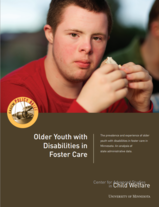 The fifth child welfare policy brief from the Center for Advanced Studies in Child Welfare is now available online. This policy brief uses state administrative data to discuss the experiences of older youth with disabilities in foster care in Minnesota, and is largely based on Dr. Katharine Hill’s dissertation, which was discussed in an earlier blog post.
The fifth child welfare policy brief from the Center for Advanced Studies in Child Welfare is now available online. This policy brief uses state administrative data to discuss the experiences of older youth with disabilities in foster care in Minnesota, and is largely based on Dr. Katharine Hill’s dissertation, which was discussed in an earlier blog post.
Both policy issues and policy solutions are provided, with links to relevant research and resources.
For a list of all of CASCW’s child welfare policy briefs, go to the Child Welfare Policy section of the CASCW website. You’ll find them on the righthand side.
Final version of Minn-LInK report on supportive housing & child well-being now available online
 The final version of the Children & Youth Services Review journal article based on the Minn-LInK report on supportive housing and child well-being has been published online. You can see the article at http://dx.doi.org/10.1016/j.childyouth.2012.03.025.
The final version of the Children & Youth Services Review journal article based on the Minn-LInK report on supportive housing and child well-being has been published online. You can see the article at http://dx.doi.org/10.1016/j.childyouth.2012.03.025.
The authors of the article are Dr. Saahoon Hong, Minn-LInK Coordinator, and Dr. Kristy Piescher, Director of Research & Evaluation, of the Center for Advanced Studies in Child Welfare. Richard A. Hooks Wayman and Benjamin Van Hunnik at Hearth Connection helped with data provision and interpretation assistance.
Register for our reflective seminar on supportive housing
On Thursday, June 7, from 1:30pm-4:30pm, Professor Esther Wattenberg of the Center for Advanced Studies in Child Welfare, School of Social Work & the Center for Urban and Regional Affairs will lead a reflective seminar at the Hubert Humphrey Center entitled “The Role of Supportive Housing in Improving Responses to High-Risk, Young Parents and Adolescents in Cross-Sector Involvement.” This seminar is free and open to the public.
The purpose of this event is to explore supportive housing, both as a concept and as a resource for two ‘deep-end’ groups that now engage our attention: young parents and cross-sector adolescents. The focal point, “Homelessness,” will feature a discussion of resources that contribute to case planning.
Current participants in this reflective seminar are:
- Benjamin VanHunnik, Director of Information, Research and Evaluation, Hearth Connection;
- Kathleen Hiniker, Social Services Program Consultant, Adolescent Services Unit, Minnesota Department of Human Services, regarding “Fostering Connections Guidance and Changes to Foster Care for Youth Ages 18-21”;
- Ann Gaasch, Program Director, FamilyWise (Formerly Genesis II for Families), to discuss her work with adolescent parents and her “High-Fidelity Wrap-around Model”; and
- Beth Holger-Ambrose, Homeless Youth Services Coordinator, Office of Economic Opportunity, Minnesota Department of Human Services.
Registration will begin at 1:15pm. Contact Esther Wattenberg or Mary Kaye LaPointe at ewattenb@umn.edu or call 612-625-6550 for more information.
This seminar is co-sponsored by the Center for Advanced Studies in Child Welfare, the School of Social Work, College of Education and Human Development, and the Center for Urban and Regional Affairs, University of Minnesota.
Three new child welfare policy briefs now available through CASCW
This month the Center for Advanced Studies in Child Welfare has three new Policy Briefs available online. CASCW’s Policy Briefs aim to explore how the field of child welfare interacts with policy and research. The Briefs serve as a “user’s guide” for policymakers and advocates, using research to uncover possible policy solutions.
 |
Child Welfare and Technology is a briefing on emerging uses of technology for Minnesota’s Child Protection, Foster Care, and Adoption service systems. This briefing builds upon CASCW’s publication CW360°: Child Welfare and Technology. |
|
 |
Child Well-Being in Minnesota: Legislative Responses to Reduce Racial and Ethnic Disparities in Child Welfare is a briefing on racial and ethnic disparities in Minnesota’s Child Protection, Foster Care, and Adoption service systems. | |
 |
Child Well-Being in Minnesota: Legislative responses to defining risk across systems for children 0-5 is a briefing on how risk is defined by Minnesota’s Early Intervention services and their role in the Child Welfare field. Overview of Early Head Start, Child Protection Screenings, and opportunities for Cross System Coordination. This briefing builds upon CASCW’s publication CW360°: Using a Developmental Approach in Child Welfare Practice. |
